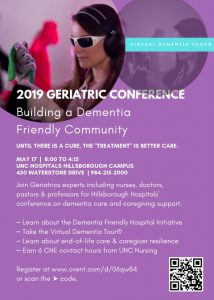Hospital-wide dementia-friendly training is well underway at UNC Hospitals Hillsborough Campus, where nearly two-thirds of all staff and providers who interact with patients have completed training. UNC Health Care is the first major health care system in the state with plans to deliver hospital-wide training to multiple partnering hospitals. After the Hillsborough pilot, the training program will expand to NC Memorial Hospital in Chapel Hill, Pardee UNC Health Care in Hendersonville, and Wayne UNC Health Care in Goldsboro.

Dementia-friendly training is underway for all staff and providers at UNC Hospital Hillsborough Campus. Funded by a grant from The Duke Endowment, UNC’s Division of Geriatric Medicine and Center for Aging and Health are piloting this ground-breaking program to improve care for patients with dementia. Maureen Dale, MD, Assistant Clinical Professor, and John Gotelli MSN, GNP, Geriatric Nurse Practitioner at Hillsborough, are leading the training, with support from Krista Wells, MSN, RN, CCRN, Clinical Nurse Education Specialist at Hillsborough Campus, and Jeff Strickler, Vice President of UNC Hospitals Hillsborough Campus. The program will expand to NC Memorial Hospital in Chapel Hill, Pardee UNC Health Care in Hendersonville, and Wayne UNC Health Care in Goldsboro.
The Dementia Friendly Hospital Initiative will:
- train 3900 employees in dementia-friendly care, increasing staff and provider confidence in their ability to assess, recognize, treat, and communicate with dementia patients;
- reach approximately 5,500 patients with dementia per year, shortening hospital length of stay and reducing 30-day hospital readmissions for these patients;
- support timely, cost-effective, and compassionate hospital care for older adults living with dementia.
An upcoming May 17 Hillsborough Campus conference, “Building a Dementia Friendly Community,” will educate providers, caregivers, and the community on dementia-friendly training at the hospital and beyond. Registration information can be found here.
The need for better care
Dementia and Alzheimer’s Disease is the 6th leading cause of death and the only leading cause for which there are no effective treatments or cures. There are approximately 160,000 North Carolinians living with dementia, a number that will grow to 260,000 by 2037. Patients with dementia pose a variety of challenges for hospitals, communities, and families, including prolonged hospital stays, poorer health outcomes, and increased readmissions and mortality rates.
UNC Health Care is the first major health care system in the state with plans to deliver hospital-wide training to multiple partnering hospitals and position for broad, system-wide dementia-friendly education and training. The first phase of training is computer-based and includes clinical staff such as physicians, nurses, pharmacists, physical therapists and occupational therapists, and non-clinical staff such as housekeeping, food services, and security.
The second training phase involves moderated discussion sessions where participants consider patient scenarios and communication strategies, and ask specific questions that are relevant to their discipline or department.
What a patient with dementia experiences
A patient with dementia who is fearful, confused, or in pain may not be able to describe what they’re experiencing. Since language and verbal ability is impacted, patients with dementia may struggle to understand information they receive and to express their needs. They might not know why they are in the hospital, how they got there, or what the motives are of the people who keep entering their room.
“Imagine if you don’t know what’s going on, you’re in this place, it’s very bright or it’s dark, you’re connected to wires, people are doing things to you … With a dementia patient their go-to is often to lash out and tell people to ‘leave me alone, stop bothering me,’” says Krista Wells, a Clinical Nurse Education Specialist at Hillsborough Campus.
If difficult and potentially unsafe behaviors (including striking out, pulling IVs, or trying to leave the room) can’t be stopped, medication may be the next step. And with more medication comes increased risk for delirium, falls, and further cognitive decline.
Using specific training and clear communication can immediately help to minimize a dementia patient’s confusion and fear, while creating a more productive environment for treatment. Dementia-friendly staff and providers gain new skills to use in a variety of situations and are empowered to act with greater understanding and efficacy.
“The biggest piece of this is awareness and understanding,” says Jenny Van Gils, OTR / L, an occupational therapist at Hillsborough Campus. “People living with brain changes are doing the best they can … we have to be the ones to change and adapt.”